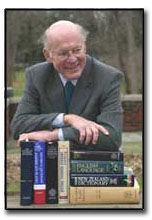November 2005
Talking about words: Small Words
with Richard W. Bailey
Here's President Nixon talking to John Dean on March 21, 1973: "Let me say that I think you could get that in cash, and I know money is hard, but there are ways."
This is one of the "smoking gun" conversations in which the president talked with his lawyer about paying for the silence of his Watergate burglars.
What is remarkable about that sentence, however, is that of the 22 words, only one of them has two syllables: money.
Getting along with just one-syllable words is not easy, and a long string of monosyllables like that one is rare.
It was an impressive feat for Louis Lipson (1921-1996) to give the 1979 commencement address at the Yale (.pdf) Law School in words of just one syllable. The graduates liked it so much he was asked to give it again in 1992. Of course he couldn't use words like litigate or jurisprudence or constitution. It was a good thing, too, that it was Yale and not some three-syllable place like Michigan.
We have a history of suspicion of long words, but we've been edgy about the short ones too.
Here's Walter Harrison writing in 1584 (in modern spelling) about the foreigners who scorn English: "… some have affirmed us rather to bark as dogs, than talk like men, because the most of our words (as they do indeed) incline unto one syllable."
Harrison is obliged to admit that these foreigners are right, but he thought things might be getting better. There were, he saw, more and longer words newly borrowed or coined, and the language was all the better for them. English speakers showed that they weren't compelled to bark in one- and two-syllable words.
Not everyone likes large words. As George Orwell advised in 1946, "Never use a long word where a short one will do."
Mark Twain had argued the same thing: "Use plain, simple language, short words and brief sentences. That is the way to write English—it is the modern way and the best way. Stick to it; don't let fluff and flowers and verbosity creep in. When you catch an adjective, kill it. No, I don't mean all, but kill most of them—then the rest will be valuable. They weaken when they are close together. They give strength when they are wide apart."
Most of the words in Twain's little tirade are just one or two syllables long. The only big ones are adjective and verbosity, and those are just the sorts of words (ones with three and four syllables) Twain wants to snuff out.
People who make up words for a living like them short too. Newly minted words for products and services need to be brief, robust and evocative. Of course they can sound (and look) that way when they come out of the imagination, but most of them require vigorous and sustained marketing to put them into common use.
Everyone knows AFLAC. Its duck is on an advertising walk of fame. But what exactly is AFLAC? "American Family Life Assurance Company." Who knew?
There are more that 3.4 million registered, pending or inactive brand names on record in the United States. Supermarkets stock 45,000 items, nearly all with brand names.
Most of them are short.
So how are these names made? Companies and consultants engage smart people with rich and abundant vocabularies. Most of the names they think up never get off the newsprint, but the really successful ones form our lives as consumers.
Take FedEx. Two syllables evoking the memory of eight in the (former) Federal Express Company. Pronounceable in every language where the company offers services. Writ large on trucks and planes, FedEx is part of the backdrop of modern advertising that is everywhere we look.
An "intercap"—the upper-case letter that erupts in the middle of a word—is suddenly everywhere too, and FedEx has seized this new trend in naming (formerly seen mainly in names like "McDonald's"). Intercaps are among the revolutionary additions to our spelling system, in which we say the names of letters rather than pronounce the sounds. When words go head-to-head, it's the intercap that gives the sizzle: " iPod" vs. "Xbox."
There are plenty of one-syllable words in our trademarks: "Tang" and "Cheer," for instance. But right now the rage is for two-syllable words like "Ziploc," "Hummer" and "Intel."
Good things, the marketers say, come in large packages with small names.
Editor's note:
Washtenaw Community College names library for Richard Bailey
 Richard W. Bailey is the Fred Newton Scott Collegiate Professor of English. His most recent book is Rogue Scholar: The Sinister Life and Celebrated Death of Edward H. Rulloff, University of Michigan Press, 2003--a biography of an American thief, impostor, murderer and would-be philologist who lived from 1821 to 1871. It was published by the University of Michigan Press in 2003.
Richard W. Bailey is the Fred Newton Scott Collegiate Professor of English. His most recent book is Rogue Scholar: The Sinister Life and Celebrated Death of Edward H. Rulloff, University of Michigan Press, 2003--a biography of an American thief, impostor, murderer and would-be philologist who lived from 1821 to 1871. It was published by the University of Michigan Press in 2003.
|

 Richard W. Bailey is the Fred Newton Scott Collegiate Professor of English. His most recent book is Rogue Scholar: The Sinister Life and Celebrated Death of Edward H. Rulloff, University of Michigan Press, 2003--a biography of an American thief, impostor, murderer and would-be philologist who lived from 1821 to 1871. It was published by the
Richard W. Bailey is the Fred Newton Scott Collegiate Professor of English. His most recent book is Rogue Scholar: The Sinister Life and Celebrated Death of Edward H. Rulloff, University of Michigan Press, 2003--a biography of an American thief, impostor, murderer and would-be philologist who lived from 1821 to 1871. It was published by the 